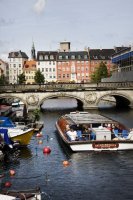The 4th Workshop on Reversible Computation will take place on July 2nd and 3rd, 2012 in Copenhagen. Copenhagen is the capital and largest city of Denmark, and the major cultural and infrastructural hub of Scandinavia.
Copenhagen is a lively and charming town, with rich shopping possibilities, especially along the pedestrian street “Strøget”, and numerous sightseeing opportunities. You can take a walk along the harbor from the Gefion Fountain, see how the Little Mermaid is doing, have lunch and a beer at Nyhavn, and visit the free city of Christiania.
In the center of Copenhagen there are many museums including the Crown Jewels at Rosenborg Castle, the National Museum with its unique collection of artifacts from the Viking era and from Greenland, the National Gallery of Denmark, and Ny Carlsberg Glyptotek with its collection of sculptures, and French and Danish paintings. Designmuseum Denmark and the Danish Architecture Centre display quality Scandinavian and Danish designs.
Tivoli, an amusement park with gardens and a concert hall, right in the middle of the city, is a “must”, and do not forget the old brewery of Carlsberg where you can learn about the history of beer and sample the wares.
In the near region (30 – 40 min. by train) you also find the unique Viking Ship Museum located at Roskilde, Louisiana and Arken, two of the top modern art museums in Europe, Hamlet’s Kronborg Castle in Elsinore, and the city Malmö in Sweden.
More information about Copenhagen can be found at visitCopenhagen.com.
University of Copenhagen
The Department of Computer Science (DIKU) is part of the Faculty of Science, University of Copenhagen, and the oldest computer science department in Denmark. The founder and first professor of DIKU, Peter Naur, received the ACM Turing Award in 2005. The University of Copenhagen is the second oldest University in Scandinavia and was founded in 1479. Today, the University of Copenhagen is ranked among the top 10 in Europe (ARWU 2010). The Faculty of Science is home to three Nobel laureates, the most prominent being the quantum physicist Niels Bohr.
Traveling to and around Copenhagen
Copenhagen airport is the main airline hub of Scandinavia with direct flights to many major destinations in Europe, Asia and the Americas.
Copenhagen Central Station is located very close the city center and offers frequent and direct train connections to Germany and Sweden.
Copenhagen center (Nørreport Station) can easily be reached from the airport (15 min by Metro) or central station (5 min by S-train). From here, most of Copenhagen can be quickly reached by public transport.
Denmark has a well-developed public transport system. The greater Copenhagen area in particular has a network of reliable and efficient transport carriers and operators: the S-train railway system, numerous Bus-lines, and the Metro, all operating with the same ticket system.
Planning your use of public transport is easy using the Journey Planner. More info on the public transport system can be found here.
Taxies are plentiful but expensive, and recommended for short trips only.
Finally, Copenhagen is a very bicycle friendly city, with bicycle lanes on all major streets. City Bikes can be found in many stalls around the central city, and can be used free of charge, with a minor coin deposit refunded after use.







